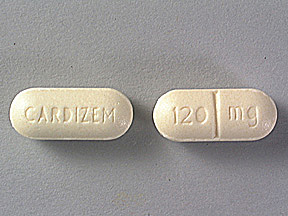
Diltiazem Hcl Coupons & Savings Card – Discount Prices from $23.74
Generic for: Cardizem
My prescription
Edit
120MG, Diltiazem Hcl (90 Tablets)
Select pharmacy

CVS
$35.62
COUPON PRICE
Albertsons
$23.74
COUPON PRICE
Walgreens
$29.88
COUPON PRICE
Walmart
$56.69
COUPON PRICEDiltiazem Hcl savings card
Show this card to your pharmacist
Albertsons
$23.74
BIN
ID
PCN
GRP
019876
LH56A64EE4
CHIPPO
LHX
Powered by
More prescriptions for psvt
More prescriptions for psvt
Price history for Cardizem (brand) & Diltiazem Hcl (generic)
90 Tablets, 120MG
Average retail price for Cardizem
Average retail price for Diltiazem Hcl
Average SaveHealth price for Diltiazem Hcl
Our price history data is based on aggregated prescription data collected from participating pharmacies in America. Our prescription data updates daily to reflect the latest price changes. If you notice a missing data point, it means there wasn't sufficient data available to generate a monetary value for that date.
We analyzed Diltiazem Hcl prices for (120MG, 90 Tablets) over the last 12 months. The average retail price was $318.31, while the average price using the SaveHealth discount card was $36.60. That's a savings of approximately 88.50% when using our Diltiazem Hcl coupon.
Compared to the generic version, Cardizem had an average price of $2274.49 over the same time period. With the SaveHealth savings card, Diltiazem Hcl is 98.39% cheaper on average than Cardizem.
*Retail prices are based on pharmacy claims data, and may not be accurate when we don't have enough claims.
Diltiazem Hcl dosage forms
Dosage Quantity Price from Per unit 30MG 1 Tablet $9.05 $9.05 30MG 30 Tablets $10.64 $0.35 30MG 90 Tablets $19.83 $0.22 30MG 100 Tablets $20.37 $0.20 30MG 120 Tablets $21.45 $0.18 30MG 270 Tablets $29.50 $0.11 30MG 500 Tablets $40.80 $0.08 60MG 1 Tablet $9.08 $9.08 60MG 30 Tablets $11.53 $0.38 60MG 90 Tablets $21.87 $0.24
| Dosage | Quantity | Price from | Per unit |
|---|---|---|---|
| 30MG | 1 Tablet | $9.05 | $9.05 |
| 30MG | 30 Tablets | $10.64 | $0.35 |
| 30MG | 90 Tablets | $19.83 | $0.22 |
| 30MG | 100 Tablets | $20.37 | $0.20 |
| 30MG | 120 Tablets | $21.45 | $0.18 |
| 30MG | 270 Tablets | $29.50 | $0.11 |
| 30MG | 500 Tablets | $40.80 | $0.08 |
| 60MG | 1 Tablet | $9.08 | $9.08 |
| 60MG | 30 Tablets | $11.53 | $0.38 |
| 60MG | 90 Tablets | $21.87 | $0.24 |
| 60MG | 100 Tablets | $22.64 | $0.23 |
| 60MG | 120 Tablets | $24.16 | $0.20 |
| 60MG | 270 Tablets | $35.62 | $0.13 |
| 60MG | 500 Tablets | $53.18 | $0.11 |
| 90MG | 30 Tablets | $8.16 | $0.27 |
| 90MG | 90 Tablets | $21.32 | $0.24 |
| 90MG | 100 Tablets | $22.03 | $0.22 |
| 90MG | 180 Tablets | $27.65 | $0.15 |
| 90MG | 270 Tablets | $33.97 | $0.13 |
| 90MG | 500 Tablets | $50.14 | $0.10 |
| 120MG | 90 Tablets | $23.74 | $0.26 |
| 120MG | 1 Tablet | $9.13 | $9.13 |
| 120MG | 30 Tablets | $12.96 | $0.43 |
| 120MG | 100 Tablets | $24.71 | $0.25 |
